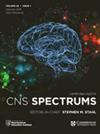The psychological and emotional relief effect of tourism on residents with autism
IF 3.4
3区 医学
Q2 CLINICAL NEUROLOGY
引用次数: 0
Abstract
Background In the context of rural revitalization, the tourism industry, as an important economic growth point, has been widely concerned. At the same time, as a special group, autistic residents are facing the challenges of psychological and emotional distress and social integration. Therefore, it is of great theoretical and practical significance to explore the development path of the rural tourism industry to alleviate the psychological emotions of autistic residents. Subjects and Methods The rural tourism industry provides opportunities for autistic residents to work and social integration. In the tourism service industry, autistic residents can play the role of tour guide, receptionist or handicraft producer. Through the accumulation of work experience, they can improve their self-confidence and social skills, and increase their sense of identity in society, which can help to improve their emotional state and self-feeling. Results Through the analysis of the psychological and emotional relief effect of autistic patients, it is found that the development path of the tourism industry under the background of rural revitalization has an emotional regulation effect on 80.65% of autistic patients. About 22.65% of people with autism showed significant improvement. Conclusions The rural tourism industry is characterized by diversity and interaction, which provides rich experience and participation opportunities. By participating in tourism activities, autistic residents can get the opportunity for physical and mental relaxation, emotional pleasure, and social interaction. Elements such as natural environment, cultural landscape and animal proximity in tourism activities provide autistic residents with sensory stimulation and emotional connection and help to improve their emotional state and self-feeling. Acknowledgement Research on the Development Strategy of Tourism Advertising Media from the Perspective of Rural Revitalization, (No. GHKJ2021-02-103); Study on the reform strategies and path of supplying side of Guangxi tourism industry under the background of global tourism, (No. 2018KY0647).旅游对自闭症患者心理情绪的缓解作用
在乡村振兴的大背景下,旅游业作为重要的经济增长点受到了广泛关注。同时,自闭症患者作为一个特殊的群体,面临着心理情绪困扰和社会融入的挑战。因此,探索乡村旅游产业的发展路径,缓解自闭症居民的心理情绪,具有重要的理论和现实意义。研究对象与方法乡村旅游产业为自闭症居民提供了就业与社会融合的机会。在旅游服务业中,自闭症居民可以扮演导游、接待员或手工艺生产者的角色。通过工作经验的积累,可以提高自信心和社交能力,增加对社会的认同感,有助于改善自己的情绪状态和自我感觉。结果通过对自闭症患者心理情绪的疏导效果分析,发现乡村振兴背景下的旅游产业发展路径对80.65%的自闭症患者有情绪调节作用。约22.65%的自闭症患者表现出显著改善。结论乡村旅游产业具有多样性和互动性的特点,提供了丰富的体验和参与机会。通过参与旅游活动,自闭症患者可以获得身心放松、情感愉悦、社交互动的机会。旅游活动中的自然环境、人文景观、动物亲近等元素为自闭症居民提供了感官刺激和情感联系,有助于改善他们的情绪状态和自我感觉。乡村振兴视角下的旅游广告媒体发展策略认知研究,第2期。ghkj2021 - 02 - 103);全球旅游背景下广西旅游产业供给侧改革策略与路径研究,(2018KY0647)。
本文章由计算机程序翻译,如有差异,请以英文原文为准。
求助全文
约1分钟内获得全文
求助全文
来源期刊

CNS Spectrums
医学-精神病学
CiteScore
6.20
自引率
6.10%
发文量
239
审稿时长
>12 weeks
期刊介绍:
CNS Spectrums covers all aspects of the clinical neurosciences, neurotherapeutics, and neuropsychopharmacology, particularly those pertinent to the clinician and clinical investigator. The journal features focused, in-depth reviews, perspectives, and original research articles. New therapeutics of all types in psychiatry, mental health, and neurology are emphasized, especially first in man studies, proof of concept studies, and translational basic neuroscience studies. Subject coverage spans the full spectrum of neuropsychiatry, focusing on those crossing traditional boundaries between neurology and psychiatry.
 求助内容:
求助内容: 应助结果提醒方式:
应助结果提醒方式:


